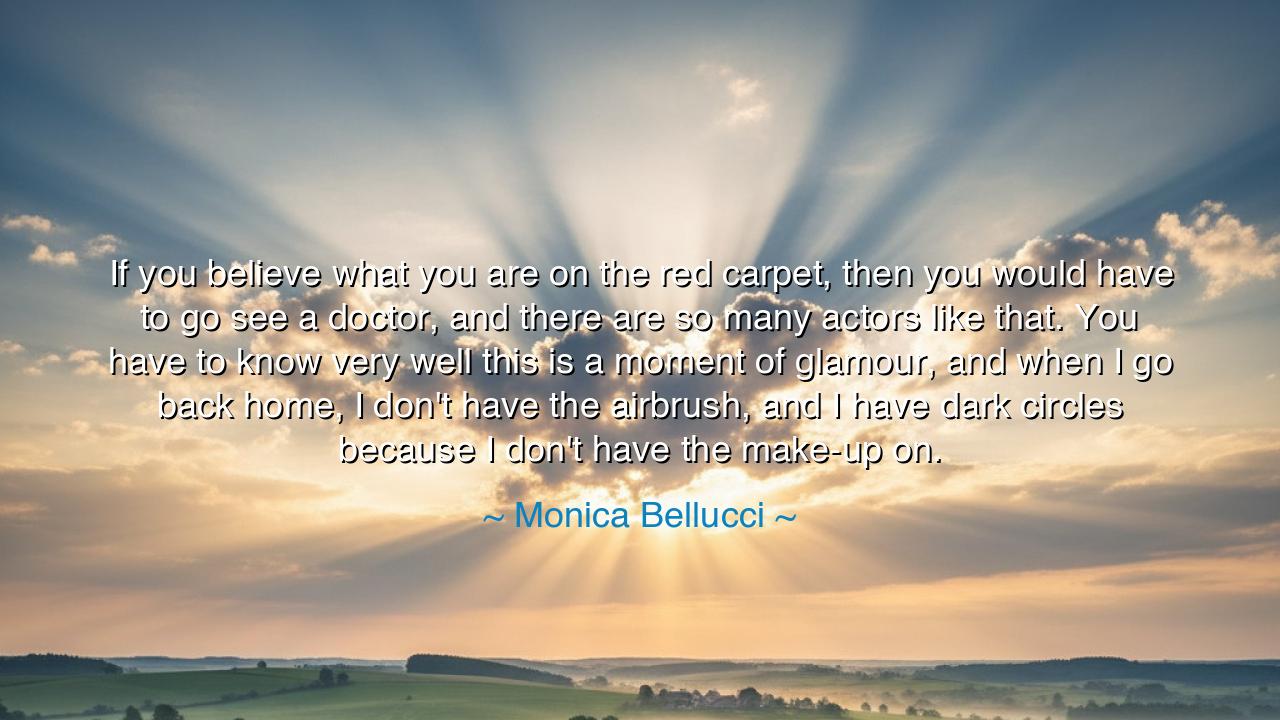
If you believe what you are on the red carpet, then you would
If you believe what you are on the red carpet, then you would have to go see a doctor, and there are so many actors like that. You have to know very well this is a moment of glamour, and when I go back home, I don't have the airbrush, and I have dark circles because I don't have the make-up on.






When Monica Bellucci said, “If you believe what you are on the red carpet, then you would have to go see a doctor, and there are so many actors like that. You have to know very well this is a moment of glamour, and when I go back home, I don’t have the airbrush, and I have dark circles because I don’t have the make-up on,” she spoke not merely as an actress, but as a philosopher of illusion and truth. Her words shine like a mirror held before the age of vanity, reflecting the eternal struggle between appearance and authenticity. Beneath the glitter of her statement lies a profound truth known to the ancients: that the masks we wear in the world are but shadows of who we truly are—and to mistake the mask for the face is to lose oneself entirely.
The red carpet, in Bellucci’s words, is not just a literal place—it is a symbol, the modern arena of adoration, where beauty is magnified, where perfection is manufactured, and where applause often drowns out self-awareness. To “believe what you are on the red carpet” is to fall under the spell of illusion, to confuse the reflection for reality. It is to become drunk on admiration, forgetting that beneath the silk and the flash of cameras lies a mortal being—imperfect, human, and fleeting. Bellucci warns that those who believe their own glamour risk madness, for the soul cannot live long in the shallow air of falsehood. The doctor she mentions is not only for the body but for the spirit—one who has lost sight of the self is sick in the deepest sense.
Her insight echoes the wisdom of ancient Greece, where actors wore masks upon the stage, and philosophers reminded them—and all of society—that life itself was a kind of theatre. Socrates urged his students to “know thyself,” not the self seen by others, but the self that breathes in silence when no audience is watching. In this way, Bellucci becomes a modern oracle, reminding us that fame and beauty are passing clouds, while truth, though humbler, endures like the mountain beneath them. To live for applause is to chase the wind; to live in truth is to find the ground again.
When Bellucci speaks of returning home, removing make-up, and seeing her dark circles, she gives voice to a sacred act—the act of unmasking. It is the return from the world’s stage to the quiet of the soul. Every person, not only actors, plays many roles: the professional, the parent, the friend, the dreamer. But when night falls and all roles are laid aside, what remains is the authentic self. That self is not polished or perfected—it is real, tired, flawed, and beautiful precisely because it needs no performance. To recognize this truth is to be free. To forget it is to live as a prisoner of one’s image.
Consider Emperor Marcus Aurelius, who, despite commanding the might of Rome, wrote nightly to himself in humility: “Do not be Caesar.” He reminded his soul that the crown was but an illusion, and that the truest nobility was to remain human amidst power. In the same way, Bellucci’s wisdom teaches us that true grace does not come from how one appears in the world, but from how one remains grounded within it. The red carpet may last a moment, but the mirror at home tells the story of eternity.
Her words also carry a quiet courage. In an industry built on perfection, it is an act of rebellion to embrace imperfection. To admit to having “dark circles” in a world of airbrushes is to reclaim the dignity of being real. This is not self-deprecation, but liberation. The ancients taught that the pursuit of truth is the highest virtue. Bellucci’s truth is simple yet profound: beauty without humility becomes hollow, and glamour without grounding becomes poison. To see oneself clearly—to laugh at the illusions and love the imperfections—is to dwell in balance.
From her reflection, we learn this eternal lesson: do not let the image consume the soul. The world will always build stages and invite you to play a part—but remember who you are when the curtain falls. Celebrate moments of triumph and beauty, but do not cling to them. When you return home, take off the mask and sit quietly with your truest self. That is where peace is found—not in the glitter of the red carpet, but in the stillness of your own reflection.
So, let Monica Bellucci’s words stand as a lamp for all who walk between the worlds of appearance and truth. Cherish the moments of glamour, but hold them lightly. Know that you are not your costume, not your applause, not your perfection—but something far more sacred: a living soul, radiant in its humanity, beautiful even in its flaws. For those who remember this truth will never lose themselves, no matter how bright the lights may shine.






AAdministratorAdministrator
Welcome, honored guests. Please leave a comment, we will respond soon